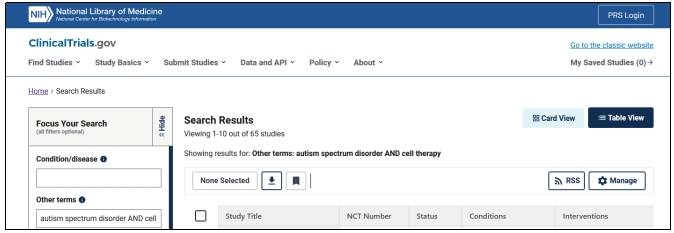According to data released by the National Institutes of Health (NIH), up to now, there have been 65 clinical registered trials on cell therapy for ASD, and the following are the research results from various sources on cell therapy for ASD.
1. Research on BMMNC Treatment for ASD:
– In an open-label trial, researchers used autologous bone marrow mononuclear cells (BMMNC) therapy on 32 ASD subjects. Postoperative ISAA measurements showed improvements in eye contact, social interaction, learning abilities, reduced response times to calls, decreased abnormal noises while speaking, and emotional abnormalities recovery for all patients.
– In another study, autologous BMMNC (intrathecal) transplantation was performed on an ASD patient with epilepsy. Postoperative assessments in multiple areas of ASD showed progress, and no major adverse events occurred; 6 months later, improvements were observed in the patient’s attention, sleep, social interaction, memory, and decreased brain metabolism (as confirmed by PET scans).
2. Research on HUCBC Treatment for ASD:
– Duke University conducted a Phase I clinical trial on autism using intravenous infusion of human umbilical cord blood stem cells (HUCBC) therapy. Follow-up indicated that this treatment was safe for 25 ASD patients, with general improvements in ASD clinical symptoms. Additionally, participants with initially lower non-verbal IQ scores showed significant progress in behavioral areas.
– In 2019, researchers at Duke University completed a Phase II study involving a single intravenous injection of autologous or allogeneic HUCBC in 180 participants. Results showed a significant improvement in patients’ overall Clinical Global Impression (CGI) scores, with significant improvements observed in toy use and communication activities.
3. Research on UC-MSCs Treatment for ASD:
– Domestic researchers conducted a Phase I/II clinical trial on UC-MSCs combined with CBMNCs for ASD, recruiting a total of 37 subjects. Postoperatively, improvements were observed in social and behavioral aspects, enhanced eye contact, reduced emotional and aggressive reactions, decreased hyperactivity and unstable speech. No severe adverse events were reported, with only 5 patients experiencing mild fevers.
– Jessica et al. conducted an open-label Phase I dose-escalation clinical trial on ASD using UC-MSCs in 12 patients, and after surgery, at least one of the three ASD indicators (CGI: Clinical Global Impression Improvement Scale; PDDBI: Pervasive Developmental Behavior Inventory Autism Composite; VABS: Social Subscale Standard Scores) showed significant improvement in 10 patients.
4. Research on Embryonic Stem Cell Therapy for ASD:
– Bradstreet et al. conducted an open-label pilot study on ASD, involving 45 patients and using HSC and embryonic stem cells for combined treatment. Postoperative observations revealed improvements in emotions, eye contact, and appetite in 78% of children; at the 1-year follow-up, significant increases in CD3+ lymphocytes and CD4+ helper cells were noted, while CD19+B lymphocytes decreased. No adverse events were observed in the treated subjects.
Summary: Analyzing trials of different types of stem cells in treating ASD over the past few decades, it is evident that apart from common mild adverse events such as vomiting, nausea, and mild pain, all results indicate that this therapy is safe and feasible for ASD patients of different ages. It is important to note that there are not many Phase II studies conducted on different cell types, and more human studies with comparable differences in control group standardization are needed in the future to establish sufficient feasibility and safety.
References:
1. Sabiha Shamim, Nasar Khan, David L Greene, Umm E Habiba & Amna Ume. The promise of autologous and allogeneic cellular therapies in the clinical trials of autism spectrum disorder. http://creativecommons.org/licenses/by-nc-nd/4.0/.
2. https://clinicaltrials.gov/search?term=autism%20spectrum%20disorder%20AND%20cell%20therapy&page=1.


